If you live in the United States, the data broker Radaris likely knows a great deal about you, and they are happy to sell what they know to anyone. But how much do we know about Radaris? Publicly available data indicates that in addition to running a dizzying array of people-search websites, the co-founders of Radaris operate multiple Russian-language dating services and affiliate programs. It also appears many of their businesses have ties to a California marketing firm that works with a Russian state-run media conglomerate currently sanctioned by the U.S. government.
Formed in 2009, Radaris is a vast people-search network for finding data on individuals, properties, phone numbers, businesses and addresses. Search for any American’s name in Google and the chances are excellent that a listing for them at Radaris.com will show up prominently in the results.
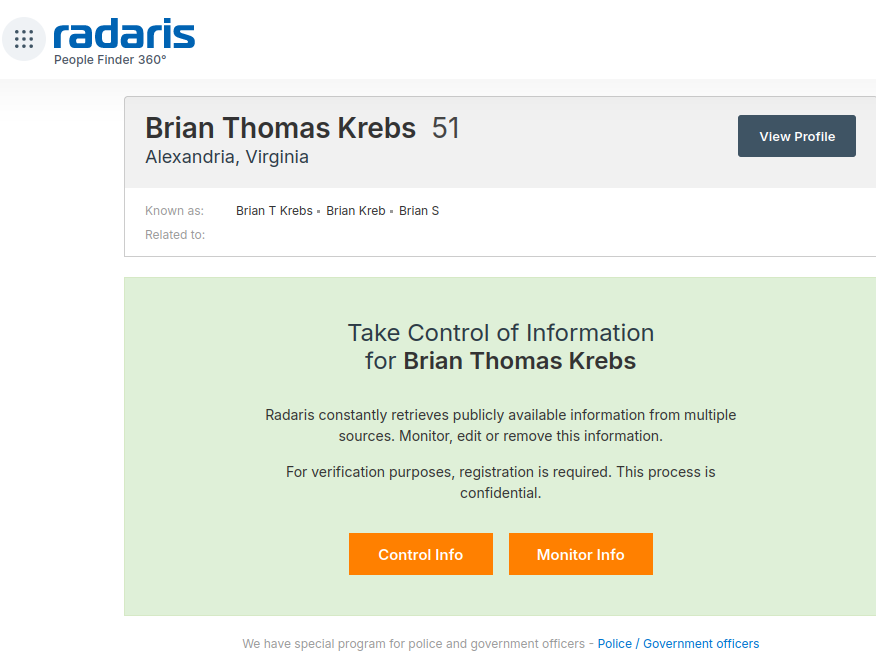
Radaris reports typically bundle a substantial amount of data scraped from public and court documents, including any current or previous addresses and phone numbers, known email addresses and registered domain names. The reports also list address and phone records for the target’s known relatives and associates. Such information could be useful if you were trying to determine the maiden name of someone’s mother, or successfully answer a range of other knowledge-based authentication questions.
Currently, consumer reports advertised for sale at Radaris.com are being fulfilled by a different people-search company called TruthFinder. But Radaris also operates a number of other people-search properties — like Centeda.com — that sell consumer reports directly and behave almost identically to TruthFinder: That is, reel the visitor in with promises of detailed background reports on people, and then charge a $34.99 monthly subscription fee just to view the results.
The Better Business Bureau (BBB) assigns Radaris a rating of “F” for consistently ignoring consumers seeking to have their information removed from Radaris’ various online properties. Of the 159 complaints detailed there in the last year, several were from people who had used third-party identity protection services to have their information removed from Radaris, only to receive a notice a few months later that their Radaris record had been restored.
What’s more, Radaris’ automated process for requesting the removal of your information requires signing up for an account, potentially providing more information about yourself that the company didn’t already have (see screenshot above).
Radaris has not responded to requests for comment.
Radaris, TruthFinder and others like them all force users to agree that their reports will not be used to evaluate someone’s eligibility for credit, or a new apartment or job. This language is so prominent in people-search reports because selling reports for those purposes would classify these firms as consumer reporting agencies (CRAs) and expose them to regulations under the Fair Credit Reporting Act (FCRA).
These data brokers do not want to be treated as CRAs, and for this reason their people search reports typically do not include detailed credit histories, financial information, or full Social Security Numbers (Radaris reports include the first six digits of one’s SSN).
But in September 2023, the U.S. Federal Trade Commission found that TruthFinder and another people-search service Instant Checkmate were trying to have it both ways. The FTC levied a $5.8 million penalty against the companies for allegedly acting as CRAs because they assembled and compiled information on consumers into background reports that were marketed and sold for employment and tenant screening purposes.
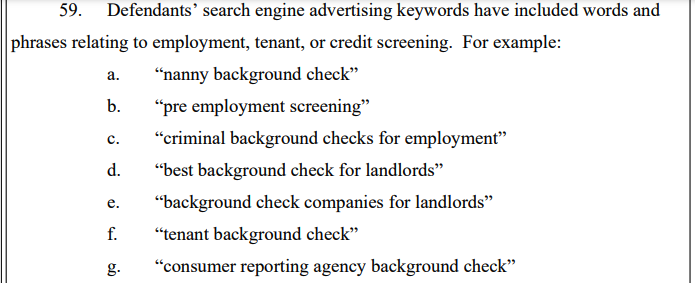
An excerpt from the FTC’s complaint against TruthFinder and Instant Checkmate.
The FTC also found TruthFinder and Instant Checkmate deceived users about background report accuracy. The FTC alleges these companies made millions from their monthly subscriptions using push notifications and marketing emails that claimed that the subject of a background report had a criminal or arrest record, when the record was merely a traffic ticket.
“All the while, the companies touted the accuracy of their reports in online ads and other promotional materials, claiming that their reports contain “the MOST ACCURATE information available to the public,” the FTC noted. The FTC says, however, that all the information used in their background reports is obtained from third parties that expressly disclaim that the information is accurate, and that TruthFinder and Instant Checkmate take no steps to verify the accuracy of the information.
The FTC said both companies deceived customers by providing “Remove” and “Flag as Inaccurate” buttons that did not work as advertised. Rather, the “Remove” button removed the disputed information only from the report as displayed to that customer; however, the same item of information remained visible to other customers who searched for the same person.
The FTC also said that when a customer flagged an item in the background report as inaccurate, the companies never took any steps to investigate those claims, to modify the reports, or to flag to other customers that the information had been disputed.
WHO IS RADARIS?
According to Radaris’ profile at the investor website Pitchbook.com, the company’s founder and “co-chief executive officer” is a Massachusetts resident named Gary Norden, also known as Gary Nard.
An analysis of email addresses known to have been used by Mr. Norden shows his real name is Igor Lybarsky (also spelled Lubarsky). Igor’s brother Dmitry, who goes by “Dan,” appears to be the other co-CEO of Radaris. Dmitry Lybarsky’s Facebook/Meta account says he was born in March 1963.

The Lybarsky brothers Dmitry or “Dan” (left) and Igor a.k.a. “Gary,” in an undated photo.
Indirectly or directly, the Lybarskys own multiple properties in both Sherborn and Wellesley, Mass. However, the Radaris website is operated by an offshore entity called Bitseller Expert Ltd, which is incorporated in Cyprus. Neither Lybarsky brother responded to requests for comment.
A review of the domain names registered by Gary Norden shows that beginning in the early 2000s, he and Dan built an e-commerce empire by marketing prepaid calling cards and VOIP services to Russian expatriates who are living in the United States and seeking an affordable way to stay in touch with loved ones back home.
In 2012, the main company in charge of providing those calling services — Wellesley Hills, Mass-based Unipoint Technology Inc. — was fined $179,000 by the U.S. Federal Communications Commission, which said Unipoint never applied for a license to provide international telecommunications services.
DomainTools.com shows the email address gnard@unipointtech.com is tied to 137 domains, including radaris.com. DomainTools also shows that the email addresses used by Gary Norden for more than two decades — epop@comby.com, gary@barksy.com and gary1@eprofit.com, among others — appear in WHOIS registration records for an entire fleet of people-search websites, including: centeda.com, virtory.com, clubset.com, kworld.com, newenglandfacts.com, and pub360.com.
Still more people-search platforms tied to Gary Norden– like publicreports.com and arrestfacts.com — currently funnel interested customers to third-party search companies, such as TruthFinder and PersonTrust.com.
The email addresses used by Gary Nard/Gary Norden are also connected to a slew of data broker websites that sell reports on businesses, real estate holdings, and professionals, including bizstanding.com, homemetry.com, trustoria.com, homeflock.com, rehold.com, difive.com and projectlab.com.
AFFILIATE & ADULT
Domain records indicate that Gary and Dan for many years operated a now-defunct pay-per-click affiliate advertising network called affiliate.ru. That entity used domain name servers tied to the aforementioned domains comby.com and eprofit.com, as did radaris.ru.
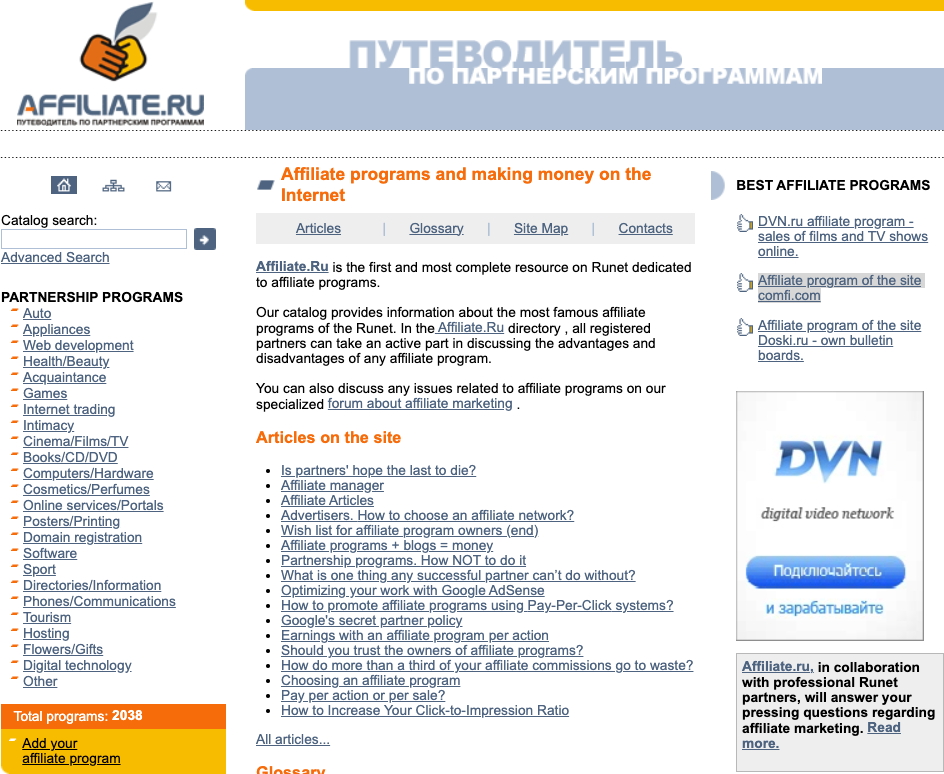
A machine-translated version of Affiliate.ru, a Russian-language site that advertised hundreds of money making affiliate programs, including the Comfi.com prepaid calling card affiliate.
Comby.com used to be a Russian language social media network that looked a great deal like Facebook. The domain now forwards visitors to Privet.ru (“hello” in Russian), a dating site that claims to have 5 million users. Privet.ru says it belongs to a company called Dating Factory, which lists offices in Switzerland. Privet.ru uses the Gary Norden domain eprofit.com for its domain name servers.
Dating Factory’s website says it sells “powerful dating technology” to help customers create unique or niche dating websites. A review of the sample images available on the Dating Factory homepage suggests the term “dating” in this context refers to adult websites. Dating Factory also operates a community called FacebookOfSex, as well as the domain analslappers.com.
RUSSIAN AMERICA
Email addresses for the Comby and Eprofit domains indicate Gary Norden operates an entity in Wellesley Hills, Mass. called RussianAmerican Holding Inc. (russianamerica.com). This organization is listed as the owner of the domain newyork.ru, which is a site dedicated to orienting newcomers from Russia to the Big Apple.
Newyork.ru’s terms of service refer to an international calling card company called ComFi Inc. (comfi.com) and list an address as PO Box 81362 Wellesley Hills, Ma. Other sites that include this address are russianamerica.com, russianboston.com, russianchicago.com, russianla.com, russiansanfran.com, russianmiami.com, russiancleveland.com and russianseattle.com (currently offline).
ComFi is tied to Comfibook.com, which was a search aggregator website that collected and published data from many online and offline sources, including phone directories, social networks, online photo albums, and public records.
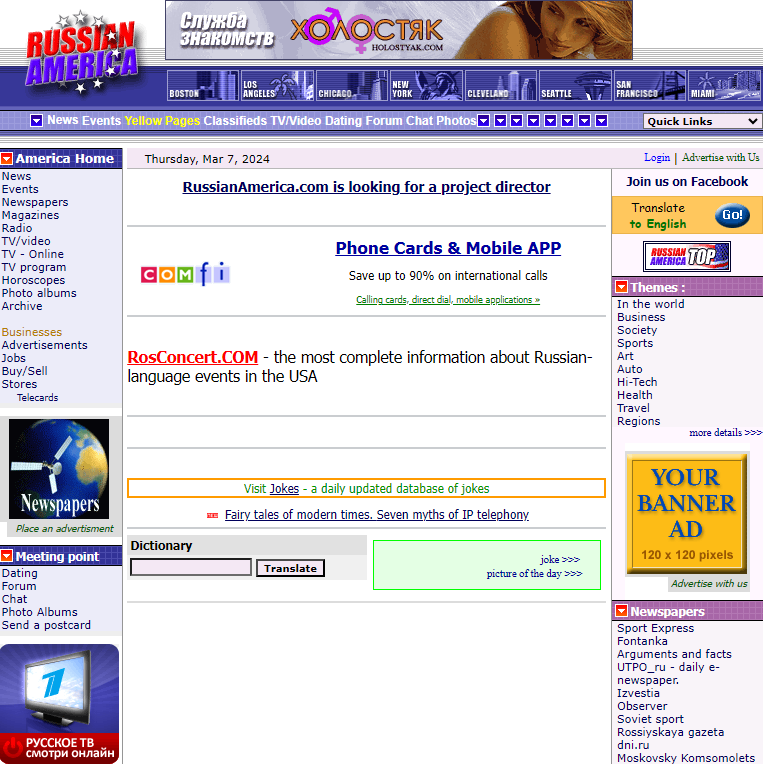
The current website for russianamerica.com. Note the ad in the bottom left corner of this image for Channel One, a Russian state-owned media firm that is currently sanctioned by the U.S. government.
AMERICAN RUSSIAN MEDIA
Many of the U.S. city-specific online properties apparently tied to Gary Norden include phone numbers on their contact pages for a pair of Russian media and advertising firms based in southern California. The phone number 323-874-8211 appears on the websites russianla.com, russiasanfran.com, and rosconcert.com, which sells tickets to theater events performed in Russian.
Historic domain registration records from DomainTools show rosconcert.com was registered in 2003 to Unipoint Technologies — the same company fined by the FCC for not having a license. Rosconcert.com also lists the phone number 818-377-2101.
A phone number just a few digits away — 323-874-8205 — appears as a point of contact on newyork.ru, russianmiami.com, russiancleveland.com, and russianchicago.com. A search in Google shows this 82xx number range — and the 818-377-2101 number — belong to two different entities at the same UPS Store mailbox in Tarzana, Calif: American Russian Media Inc. (armediacorp.com), and Lamedia.biz.
Armediacorp.com is the home of FACT Magazine, a glossy Russian-language publication put out jointly by the American-Russian Business Council, the Hollywood Chamber of Commerce, and the West Hollywood Chamber of Commerce.
Lamedia.biz says it is an international media organization with more than 25 years of experience within the Russian-speaking community on the West Coast. The site advertises FACT Magazine and the Russian state-owned media outlet Channel One. Clicking the Channel One link on the homepage shows Lamedia.biz offers to submit advertising spots that can be shown to Channel One viewers. The price for a basic ad is listed at $500.
In May 2022, the U.S. government levied financial sanctions against Channel One that bar US companies or citizens from doing business with the company.

The website of lamedia.biz offers to sell advertising on two Russian state-owned media firms currently sanctioned by the U.S. government.
LEGAL ACTIONS AGAINST RADARIS
In 2014, a group of people sued Radaris in a class-action lawsuit claiming the company’s practices violated the Fair Credit Reporting Act. Court records indicate the defendants never showed up in court to dispute the claims, and as a result the judge eventually awarded the plaintiffs a default judgement and ordered the company to pay $7.5 million.
But the plaintiffs in that civil case had a difficult time collecting on the court’s ruling. In response, the court ordered the radaris.com domain name (~9.4M monthly visitors) to be handed over to the plaintiffs.
However, in 2018 Radaris was able to reclaim their domain on a technicality. Attorneys for the company argued that their clients were never named as defendants in the original lawsuit, and so their domain could not legally be taken away from them in a civil judgment.
“Because our clients were never named as parties to the litigation, and were never served in the litigation, the taking of their property without due process is a violation of their rights,” Radaris’ attorneys argued.
In October 2023, an Illinois resident filed a class-action lawsuit against Radaris for allegedly using people’s names for commercial purposes, in violation of the Illinois Right of Publicity Act.
On Feb. 8, 2024, a company called Atlas Data Privacy Corp. sued Radaris LLC for allegedly violating “Daniel’s Law,” a statute that allows New Jersey law enforcement, government personnel, judges and their families to have their information completely removed from people-search services and commercial data brokers. Atlas has filed at least 140 similar Daniel’s Law complaints against data brokers recently.
Daniel’s Law was enacted in response to the death of 20-year-old Daniel Anderl, who was killed in a violent attack targeting a federal judge (his mother). In July 2020, a disgruntled attorney who had appeared before U.S. District Judge Esther Salas disguised himself as a Fedex driver, went to her home and shot and killed her son (the judge was unharmed and the assailant killed himself).
Earlier this month, The Record reported on Atlas Data Privacy’s lawsuit against LexisNexis Risk Data Management, in which the plaintiffs representing thousands of law enforcement personnel in New Jersey alleged that after they asked for their information to remain private, the data broker retaliated against them by freezing their credit and falsely reporting them as identity theft victims.
Another data broker sued by Atlas Data Privacy — pogodata.com — announced on Mar. 1 that it was likely shutting down because of the lawsuit.
“The matter is far from resolved but your response motivates us to try to bring back most of the names while preserving redaction of the 17,000 or so clients of the redaction company,” the company wrote. “While little consolation, we are not alone in the suit – the privacy company sued 140 property-data sites at the same time as PogoData.”
Atlas says their goal is convince more states to pass similar laws, and to extend those protections to other groups such as teachers, healthcare personnel and social workers. Meanwhile, media law experts say they’re concerned that enacting Daniel’s Law in other states would limit the ability of journalists to hold public officials accountable, and allow authorities to pursue criminals charges against media outlets that publish the same type of public and governments records that fuel the people-search industry.
PEOPLE-SEARCH CARVE-OUTS
There are some pending changes to the US legal and regulatory landscape that could soon reshape large swaths of the data broker industry. But experts say it is unlikely that any of these changes will affect people-search companies like Radaris.
On Feb. 28, 2024, the White House issued an executive order that directs the U.S. Department of Justice (DOJ) to create regulations that would prevent data brokers from selling or transferring abroad certain data types deemed too sensitive, including genomic and biometric data, geolocation and financial data, as well as other as-yet unspecified personal identifiers. The DOJ this week published a list of more than 100 questions it is seeking answers to regarding the data broker industry.
In August 2023, the Consumer Financial Protection Bureau (CFPB) announced it was undertaking new rulemaking related to data brokers.
Justin Sherman, an adjunct professor at Duke University, said neither the CFPB nor White House rulemaking will likely address people-search brokers because these companies typically get their information by scouring federal, state and local government records. Those government files include voting registries, property filings, marriage certificates, motor vehicle records, criminal records, court documents, death records, professional licenses, bankruptcy filings, and more.
“These dossiers contain everything from individuals’ names, addresses, and family information to data about finances, criminal justice system history, and home and vehicle purchases,” Sherman wrote in an October 2023 article for Lawfare. “People search websites’ business pitch boils down to the fact that they have done the work of compiling data, digitizing it, and linking it to specific people so that it can be searched online.”
Sherman said while there are ongoing debates about whether people search data brokers have legal responsibilities to the people about whom they gather and sell data, the sources of this information — public records — are completely carved out from every single state consumer privacy law.
“Consumer privacy laws in California, Colorado, Connecticut, Delaware, Indiana, Iowa, Montana, Oregon, Tennessee, Texas, Utah, and Virginia all contain highly similar or completely identical carve-outs for ‘publicly available information’ or government records,” Sherman wrote. “Tennessee’s consumer data privacy law, for example, stipulates that “personal information,” a cornerstone of the legislation, does not include ‘publicly available information,’ defined as:
“…information that is lawfully made available through federal, state, or local government records, or information that a business has a reasonable basis to believe is lawfully made available to the general public through widely distributed media, by the consumer, or by a person to whom the consumer has disclosed the information, unless the consumer has restricted the information to a specific audience.”
Sherman said this is the same language as the carve-out in the California privacy regime, which is often held up as the national leader in state privacy regulations. He said with a limited set of exceptions for survivors of stalking and domestic violence, even under California’s newly passed Delete Act — which creates a centralized mechanism for consumers to ask some third-party data brokers to delete their information — consumers across the board cannot exercise these rights when it comes to data scraped from property filings, marriage certificates, and public court documents, for example.
“With some very narrow exceptions, it’s either extremely difficult or impossible to compel these companies to remove your information from their sites,” Sherman told KrebsOnSecurity. “Even in states like California, every single consumer privacy law in the country completely exempts publicly available information.”
Below is a mind map that helped KrebsOnSecurity track relationships between and among the various organizations named in the story above:




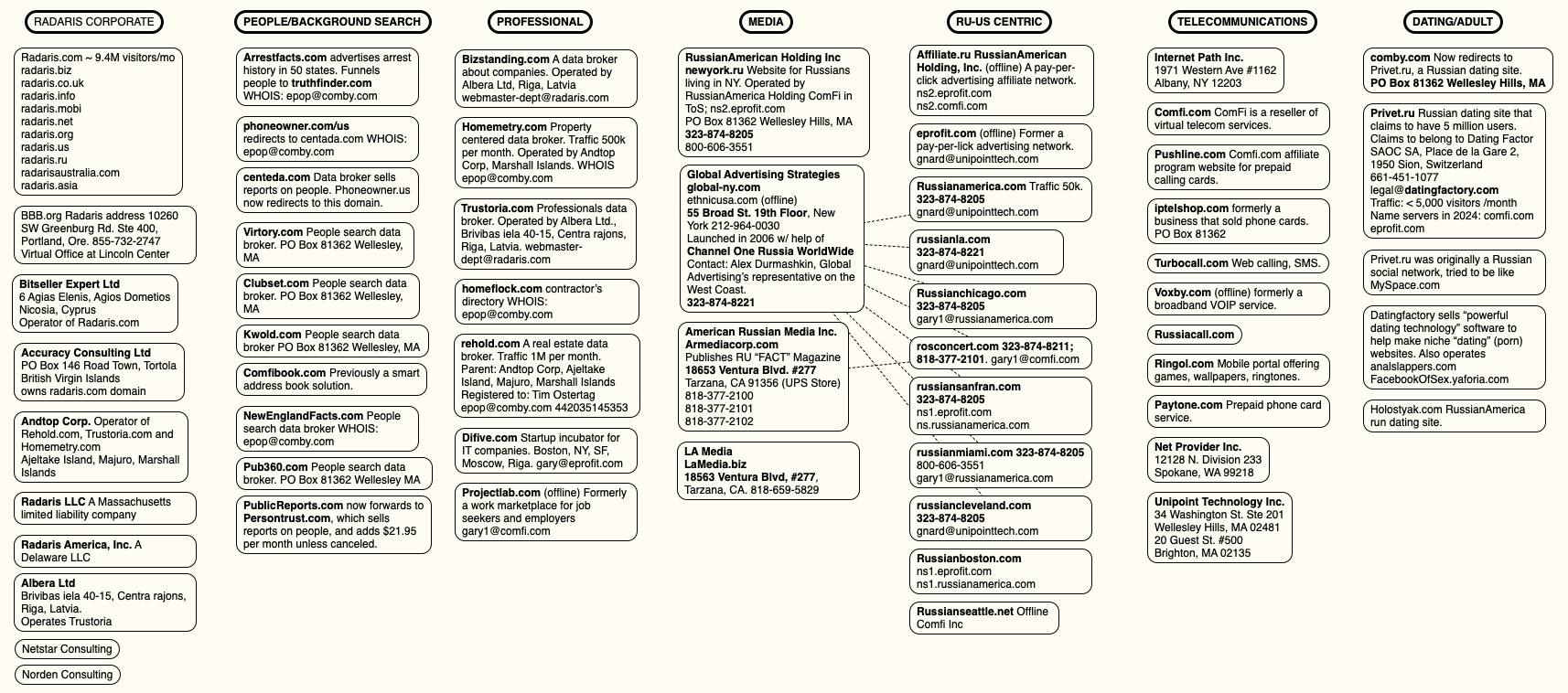

OMG Brian I am SOOOO happy that you started investigating on personal information selling. This is such a pleague for US citizen, and it is so hard to protect our privacy. Even if you don’t have an account on social media (where you tacitely agree that you are a product and selling your personal data is the price to oay for the free use of the social media site) these businesses still find your personal info and sell it to anyone. I am very thankful for your work on uncovering this harmful business industry.
Some really valuable insights here!
I completely agree! In the old days we could pay a token sum to not be listed in the phone book if we didn’t want people to be able to find us. Now, we have no choice at all and these scumbags are profiting off our personal details. Despite their scraping public records, I think there should still be a way for us to opt out.
It’s also a safety issue. Anyone with a few bucks can find our information and use it for nefarious purposes such as doxxing and stalking, with women particularly targeted in these areas.
I find it infuriating they try to carve out a clause to protect government workers rather than legal citizens. Thanks Brian keep up the good work.
It’s uncanny. In the early ’50s of the 20th century, Congressman Joe MaCarthy rocked politics with allegations of Communist infiltration of America. Most of that was sheer nonsense, but regardless, people lost their livelihoods, among them a scientist who last name was Oppenheimer. But now, in the early 20’s of the 21st century, we are truly infiltrated not just by one country, but possibly several, and Americans seem to be saying, “So what else is new?”
I can see the ghost of McCarthy doing a face palm and shaking his head.
“Most of that was sheer nonsense..” Well no that’s not correct, but it has been the mantra since. If you do the research, you’ll find that out. Not that any of it matters much anymore.
#1 at something finally!
My life is now complete.
Thanks Mr. Brian
Wow, just wow! Incredible work Brian!
Thanks for digging this up and summarizing in a way that makes sense.
I love how your mind works and I appreciate that fact that you choose to use your talents for the better good.
Excellent journalism! Now if we can just get government agencies (including foreign agencies) to stop using Big Data to spy on US citizens. Second, all the states need to pass their own versions of the California Consumer Privacy Act.
Wow. What an amazing article. I like the way you moved past the dodgy brothers and their sharp practices, to the way lawyers enable/protect such practices (by exploiting ‘technicalities’), to the true source of the problem: which is that compiling ‘publicly available’ information into a more easily searchable format, and providing a more efficient (remote, electronic) search service can never be a crime. What protected most of us most of the time was that accessing publicly available information used to be an almighty pain in the *** as it used to be siloed by geography, function and organisation. Searching through it required time, effort and physical attendance. But not anymore. Now we need new laws to match new methods.
Excellent work Brian. It seems we were all too naïve when the World Wide Web was in its infancy and businesses, special interests and not to mention criminals have made sure no meaningful changes relating to the protection of personal information have been implemented.
Please keep up the good fight.
OUTSTANDING reporting, Brian; kudos — and thanks!
Russians are not just infiltrating the US. See the linked article in Der Spiegel
https://www.spiegel.de/international/business/jan-marsalek-an-agent-for-russia-the-double-life-of-the-former-wirecard-executive-a-7e667c03-6690-41e6-92ad-583d94ba97e0
The Jan Marsalek piece was a joint investigation with The Insider, ZDF, and Der Standard.
Another related article worth reading here;
https://theins.ru/en/politics/269612
Anyone care to comment on the effectiveness of Data Removal Services like Optery or Privacy Bee? It’s kinda like chasing your tail, because the removed info pops right back up weeks later, so, an on-going subscription is required. But, they do remove from at least some/the most common sites…at least the ones that will honor the removal request.
So, any experience with these services? Are they worth the 200 or so annual dollars? THanks.
I signed up for Optery over a year ago and it is way more effective than my personal attempts to whack the mole. It saves me hours of time. I liked it enough that I recently upgraded to the family plan to cover my spouse. This service is not inexpensive, but I feel it is worth it. Identify theft is rampant. Why make it easy?
Thanks for the information, Alexandra. I’ll probably sign-up with Optery soon. It’s not a magic bullet, but it can’t hurt. Some Data Broker sites have way more information about you than they should…really surprised me.
I’ve seen ads for “incognito” I think it was? The whole point is you pay them to contact data brokers to request your information be deleted. Based on some of the things you wrote, their service would seem ineffective. Is that fair to say? If I can’t successfully demand my records be removed, than how can a company accomplish this for me?
That mind map at the end Brian, is pure GOLD. I’m sure Messrs Dmitry and Igor are feeling rather uncomfortable right now, knowing the entirety of their digital lives have been collated down to a single page and published for the whole world to see. Now they get to experience what it feels like for the millions of faceless peoples data, that they have profited off from for so long.
What’s ironic here, is due to Russia’s wild west in the data brokerage space, this is exactly how Bellingcat investigators outed the Skirpal and Nalvalny poisoners, among others. Every public/private government/corporate database that has ever been corruptly leaked over the last 2 decades is available somewhere online. By cross referencing social media, passport, travel, phone, residential, military and even food delivery records they were able to pinpoint the GRU and FSB agents responsible.
Some people will say information is power. But more importantly it is responsibility, because what you do with that information will always define you. Moving forward, there will always be difficult moral and ethical decisions to be made by Western legislators in this space. Excellent reporting, thank you.
Very timely article. Senator Ron Wyden revealed that the NSA (and other branches of government) have been purchasing sensitive information on US citizens from these data brokers that would otherwise require the government to get a search warrant to obtain. So, arguably, the government has a vested interest in allowing these folks to continue their operation.
https://arstechnica.com/tech-policy/2024/01/nsa-finally-admits-to-spying-on-americans-by-purchasing-sensitive-data/
While the worry of many seems to be government intrusion on privacy, y’all are missing one of the main containers of actionable private information. Think about what entity knows the ins and outs of what you do, where you go, what you see, etc. That entity for the most part stays hidden, but is ubiquitous.
It’s not the government folks, it’s a commercial enterprise. I.E. your bank… If you use a debit or credit card, they know all about you. In conjunction with your cell phone location records, if you happen to bank through your smartphone, every single datum of interest about you is available. Well. to somebody, and to .gov of any country by one method or another, regardless of what country you live in.
Think about that. I don’t worry about the government having my stuff. It’s been available for a long time if they ask…
Very good point, thanks a lot. Banks used to have this data since electronic records of credit card or wire transfer started being made, i.e. probably the mid 1980s in most parts of the world.
Since the broad usage of smartphones, you can add in either Apple or Google, who do not necessarily have your payment data, but most of your online life which will paint a complementary but equally powerful picture of who you are and what you are interested in, what are your weaknesses, desires etc.
Some really valuable insights here! Thank you for your thoughts
Krebs is God.
Brian, would love you opinion on the best ways “normal citizens” can get removed from these sketchy sites. I know you don’t typically review services, but these companies seem like the next frontier of pushing privacy to influencers, youtubers, and the like (basically, I imagine it will be the “VPN ad” of 2024-2025). A lot of claims, but without a true understanding of how these services work, its hard to trust any “legitimate” service to remove data from “questionably legitimate” services.
Mozilla has gotten in the game with Mozilla Monitor, DeleteMe, and Incogni seems very popular. Found this spreadsheet that compares several (not mine, can’t speak to accuracy) https://docs.google.com/spreadsheets/d/10Vi38ZtHTyR0_LFEz-ON_RUH2ieT47z4/edit#gid=1595621103
Nice work putting this all together!
Thanks for reporting on this. I’ll hope you’ll do a lot more privacy-related stories and data brokers.
I hope these guys have embarrassing medical issue records that somehow end up in your inbox. I mean, hey, you’re not a HIPAA covered entity.
The problem is that most ‘publicly available’ information, should not be publicly available. It’s mostly the individual states that collect the information, even hunting and fishing licenses, and sell it for pennies per record. There would be no data brokers if there was no data. The ability to opt-out or remove/delete records should be done before it’s sold, not afterwards.
Very interesting, and their LinkedIn profile has no execs listed and only 135 followers…
“Atlas says their goal is convince more states to pass similar laws, and to extend those protections to other groups such as teachers, healthcare personnel and social workers”
How about, say, EVERYBODY?!
Great story and details. Now if government would do something besides ask for a cut; “The FTC levied a $5.8 million penalty” is more of a passive tax on ignore organized crime – normal, which says a lot about those colleting the money.
Do credit card companies sell your information?
Just for grins I looked up my name. Some good information…some strangely bad /off.
Do they sometimes do that in hopes that you will correct?
Quote: “Radaris reports include the first six digits of one’s SSN”
Er, check my math, but if someone gets the first six digits here, and the last four from any of a number of places, that gives the full SSN, with a check digit to spare!
Thanks again for the heads-up, Brian, and I hope this news reaches the people who could do something about it. (But they’re probably too busy banning TikTok to worry about privacy in general!)
“In August 2023, the Consumer Financial Protection Bureau (CFPB) announced it was undertaking new rulemaking related to data brokers.”
Over half a year passed by since then.and no results yet? How difficult is that task?
I could not read the whole article, because my head started spinning. What a tangled web !